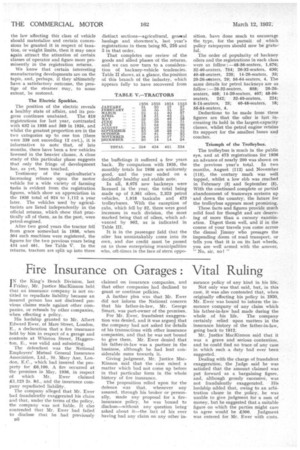Fire Insurance on Garages : Vital Ruling
Page 40

If you've noticed an error in this article please click here to report it so we can fix it.
I N the King's Bench Division, last Friday, Mr. Justice MacKinnon held that an insurance company is not entitled to repudiate liability because an insured person has not disclosed previous claims made against other companies, or refusals by other companies, when effecting a policy.
His lordship granted to Mr. Albert Edward Ewer, of Mare Street, London, E., a declaration that a fire insurance held by him in respect of a garage and contents at Whiston Street, Haggerston, E., was valid and subsisting.
The defendant was the National Employers' Mutual General Insurance Association, Ltd., St. Mary Axe, London, E.C., which had insured the property for £6,100. A fire occurred at the premises in May, 1936, in respect of which Mr. Ewer claimed £1,123 2s. 8d., and the insurance company repudiated liability.
The company alleged that Mr. Ewer had fraudulently exaggerated his claim and that, under the terms of the policy, the company was not liable. It also contended that Mr. Ewer had failed to disclose that he had previously 66 claimed on insurance companies, and that other companies had declined to grant or continue policies.
A further plea was that Mr. Ewer did not inform the National concern that his father-in-law, Mr. George Smart, was part-owner of the premises.
For Mr. Ewer, fraudulent exaggeration was denied, and it was argued that the company had not asked for details of his transactions with other insurance companies, and that he was not bound to give them. Mr. Ewer denied that his father-in-law was a partner in the business, although he had lent considerable sums towards it.
Giving judgment, Mr. Justice MacKinnon said that the case raised a matter which had not come up before in that particular form in the whole history of fire insurance.
The proposition relied upon for the defence was that, whenever any assured, through his broker or personalty, made any proposal for a fireinsurance policy, be was bound to disclose—without any question being asked about it—the fact of his ever having had any claim on any other in
surance policy of any kind in his life.
Not only was that said, but,. in this case, it was also contended that, when originally effecting his policy in 1930, Mr. Ewer was bound to inform the insurance company of any claim which his father-in-law had made during the whole of his life. The company certainly relied upon matters in the insurance history of the father-in-law, going back to 1912.
Mr. Justice MacKinnon said that it was a grave and serious contention, and he could find no trace of any case in which such a duty had ever been • suggested.
Dealing with the charge of fraudulent exaggeration, the Judge said he was satisfied that the amount claimed was and, although grossly excessive, was not fraudulently exaggerated. His lordship added that, owing to an arbitration clause in the policy, he was unable to give judgment for a sum of money, but he suggested that a suitable figure on which the parties might care to agree would be £300. Judgment was entered for Mr. Ewer with costs. put forward as a bargaining figure,




















































































